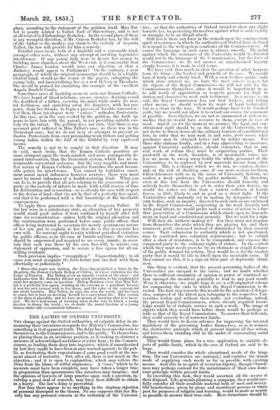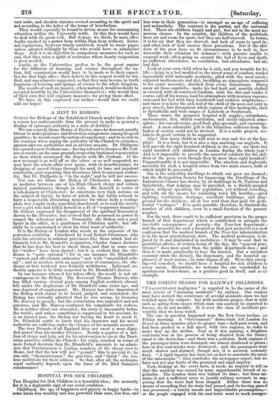Nor does there appear to us anything in the claptrap
objection Id personal disrespect to the Queen. No one supposes that her Ma- esty has any personal. concern in the visitation of the Universi-
1 ties ; or that the authorities of Oxford intend to show any slight towards her, by protecting themselves against what is said, rightly or wrongly, to be an illegal attack.
Still less is there any force in the remark upon the contumacious spirit of resistance in which the authorities of Oxford have declined to respond to the well-spoken courtesies of the Commissioners. Of course the language in such eases is always smooth. The point against which the resistance of the University would be directed would not be the language of the Commissioners, but the force of the Commission : we do not answer an unauthorized inquiry simply because it is made in civil terms. We have said thus much to clear the question of what lawyers term its fringe—the leather and prunella of the case. We would have it fairly and soberly tried. With a view to those public ends which alone interest us, we have the most sincere respect for the objects of the Royal Commission—we will not add, for the Commissioners themselves, since it would be impertinent in us to add words of approbation as respects persons too high in station and character to need such testimony. As a means to an end, the Royal Commission has our best wishes ; and failing other means, we should reckon its want of legal technicality but as a straw in the way. It would perhaps have to be brushed aside, but we would not allow it to retard our course for a moment if possible. Nevertheless, we are not so enamoured of violent re- medies that we would have recourse to them, except in ease of need. And if (as for the moment we assume) the legal and con- stitutional right should be on the side of the University, we do not desire to throw down all the ordinary barriers of constitutional law, in order that we may rush in and seize, fora ma flu, what perchance may be obtained better and by milder means. For those who clamour loudly, and in a tone approaching to insolence, against University authorities, should remember, that in any real work of reform they must be cooperating parties. Their good-will in the work, therefore, is of inestimable value, un- less we mean to sweep away bodily the whole personnel of the Universities, to be replaced by new materials drawn from other sources. This is a change which we do not, we confess, desire ; and, at the risk of shocking some of our more zealous brethren, fellow-labourers with us in the cause of University Reform, we confess a weak preference for gentler methods. If, therefore, even at this late hour the Universities should honestly and actively bestir themselves to set in order their own houses, we I would far rather see this than a violent collision of hostile forces, as little likely to end in good as a street fight. If the Universities will instantly set in motion, by delegacies of their own bodies such an inquiry, directed to such ends as are embraced in the Royal Commission, coOperating in the work heartily and with good intent, we would prefer such a course of aotion to a fur- ther prosecution of a Commission which stands open to impeach- ment on legal and constitutional grounds. But we wait for a sign.
Will they die without making it ? For they must not disguise from themselves the stake which they are playing for, and their imminent peril, increased instead of diminished by their present course. Tacit submission to authority which is not questioned, may be construed into voluntary acquiescence ; but to submit after a show of resistance, is to be vanquished, and exposes the conquered party to the ordinary rights of victors. In the contest which they must needs provoke by an obstinate or stupid defiance of the public demand for reform, they would be so far the weaker party that it would be idle to dwell upon the inevitable issue. If they cannot see this, it is a sign on their part of deplorable blind- ness.
One thing is evident, that the present governing bodies of the Universities are unequal to the crisis ; and we doubt whether there is sufficient unanimity of opinion or power of combined ac- tion amongst the members generally to lead to any good result. Were it otherwise, we might hope to see a self-originated scheme for compassing the ends to which the Royal Commission is di- rected. The first step towards this would be the selection of delega- cies, composed of the fittest men belonging to the respective Uni- versities within and without their walls—not excluding, indeed, the present Royal Commissioners, whose already acquired know- ledge would be of infinite service in such a work. The range of objects which they would have before them would be perhaps as wide as that of the Royal Commissions. To answer their full ends, they could scarcely be of narrower limits. They would have to devise schemes for improving the internal machinery of the governing bodies themselves, so as to remove the obstructive principle which at present hinders all free action, and leaves them standing still in the midst of surrounding social changes.
They would frame plans for a wise application to suitable ob- jects of public funds, which in the case of Oxford are said to be large.
They would consider the whole educational needs of the king- dom, (for our Universities are national,) and contrive the wisest mode of supplying such needs as far as possible with existing means. And this in no spirit of sectarian bigotry, though Church- men may perhaps contend for the maintenance of their own domi- nant principle within present limits. In executing this task, they would ascertain all the means at their disposal. Like generals planning a campaign, they would care- fully consider all their available material both of men and money. Old benefactions, given by pious and munificent persons in times past for purposes of religion and learning, would be made as nearly as possible to answer their true ends. Mere formalisms should be cast aside, and obsolete statutes revised according to the spirit and not according to the letter of the terms of benefaction.
They would especially be bound to devise means for economizing education within the University walls. In this they would have to deal with the great eviL But it may, we think, be more effec- tually crushed by a power from within than from without. Exter- nal regulations, however wisely contrived, would be waste paper, unless adopted willingly by those who would have to administer them. And it is an objection to compulsory- measures for such an end, that they raise a spirit of resistance where hearty cooperation is most needed.
Lastly, as the Universities profess to be the great organs for the diffusion of learning and science throughout the na- tion, full examination would have to be made as to their capaci- ties for that high office; their defects in this respect would be stu- died, and amendments suggested, so that they may become in truth fountains of learning and springs of science to the whole kingdom. The results of such an inquiry, when matured, would no doubt be accepted heartily by the Universities themselves; who would then of their own free will originate measures for giving them effect. We have in this expressed our wishes—would that we could add our hopes !



























 Previous page
Previous page